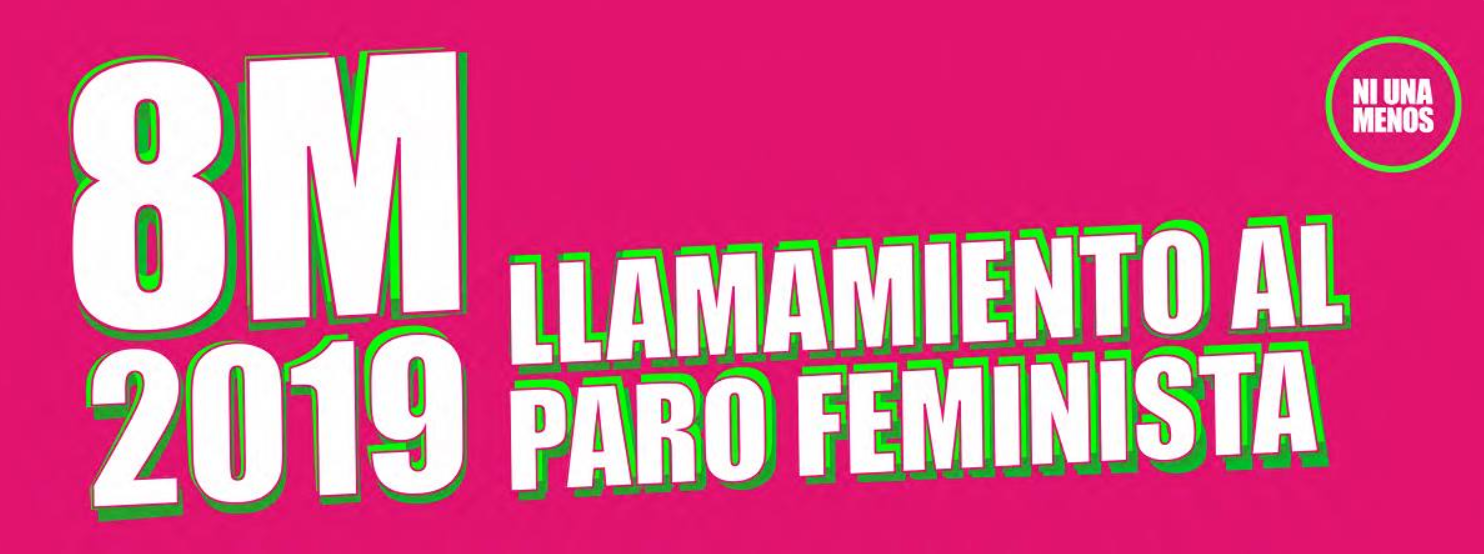
by NI UNA MENOS (Argentina)
This year, once again, we are organizing a worldwide feminist strike. Our strike will affect houses, fairs, factories, universities and all workplaces; we will strike in the forests, in the occupied fields and in the villas; we will strike in the sectors of popular economies and in the precarized ones; we will strike in the streets and in the communities, inside the hospitals and in the countryside. We will strike everywhere and that’s because, once again, we are widening the strike: we break its frontiers and we invent new geographies of strike. By doing so, we redefine the very places where people work and produce value. We recognize and give dignity to all the traditionally invisible, exploited and despised works: reproductive work, communitarian work and migrant work.
We strike against the hetero-patriarchal family and the domestic reclusion, against the exploitation of our land, against sexual abuse by powerful males, against femicides and trans murders, against the criminalization of migrant people, women and men, against clandestine abortion, patriarchal justice, the impoverishment and the rise of endemic debts, against the assassination of local leaders, against racism, against religious fanaticisms and the moralization of our desires. All in all, we strike against the structures and the mandates which enable the capitalist production of surplus-value.
We managed to keep together all these senses, timings, spaces, and practices of the strike, and we did it transversely because we became an actual anti-neoliberal movement, therefore able to stop and underline the violence which is at the foundation of capitalistic accumulation. Global fascism is a response to our consciousness. It’s a response to the vastness, radicality and transnational dimension we have accomplished as a feminist movement, starting from a multiplicity of feminist positions. We see that the Brazilian president, Jair Bolsonaro, has put on top of his program the fight against the so-called ‘gender ideology’ (a concept first created by the catholic church and used by the evangelistic one through the web campaign #ConMisHijosNoTeMetas), just after the country had experienced the biggest mobilizations led by women, lesbians, trans and queer to repudiate the murder of Marielle Franco, black, lesbian woman from favela, crying out #EleNao. We have witnessed the same fascist response in Italy with Pillon’s decree in favour of hetero-regulated family and in the victory of the far-right parties in the South of Spain. In the USA we have witnessed the impunity of the judge of the Supreme Court Kavanaugh and Trump’s cruelty against the migrants. We have seen it in Argentina, where Mauricio Macri’s government keeps imposing his neo-liberal policies resulting in the criminalization of protests, persecution of social leaders such as Milagro Sala, militarization of territories along with the feminization of poverty and the precarization of all lives.
Fascism reads our strength. It is not possible to face it by moderating the claims of the feminist movement. The feminist movement is not the cotillion of an ONG, it is not harmless in terms of political confrontation, nor can it be trivialized as a language of legitimation for neoliberal practices. There is no opposition between the urgency of starvation to which we are subjected by the crisis and feminist politics. On the contrary, we believe that the feminist movement, in all its specificity, has politicized in a new and radical way the crisis of social reproduction as a crisis both of civilization and of the patriarchal structure of society. The feminist movement stays within different organizations and this is why it is in the most urgent struggles of the present time. We have seen housewives bringing the pots to the streets and committing to the denounce of neoliberal adjustments, inflation and debt. We have seen trade unionists challenging regressive labor reforms. We have seen indigenous women from Abya Yala promoting the plurinationality of our meetings against the misogyny of parliamentarians who believe they represent the nation. We have seen black and African women defend their territories against racist and colonial violence. We have seen homeless girls discussing what the violence of illegal economies is. We have seen jailed women denouncing the prison system as the ultimate place for humiliation. We have seen women from villas taking the floor in the Senate to claim legal, safe and free abortion.
We believe that the feminist movement, in all its specificity, is producing, here and now, a new political form. It is doing so through the instrument of the strike as a political process of transversal organization of the green tide, of the uprising of new generations, of the collective listening to denounces of sexual abuse intended as abuse of power, of the rebellious genealogies that nourish a radical imagination and of the struggles against the extraction and expropriation of common resources. It is a politics that is going to change everything. It is a politics that calls into question privilege in every place, that does not tolerate impunity, that does not accept to delegate changes to experts or rescuers and refuses to speak the language of victimization.
The feminist movement has become a sounding board for all social conflicts, weaving alliances that break the patriarchal hierarchies, building complicity between struggles, developing new practices and languages for emancipation. That is why, against the neoliberal and colonial fascism that tries to double its violence, we strike. We strike because we want to revolutionize our lives. We strike because we know it will fall. We are breaking down patriarchy from below.





